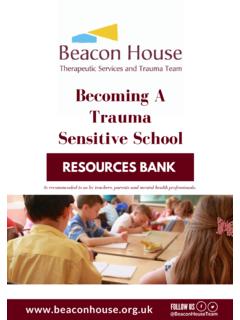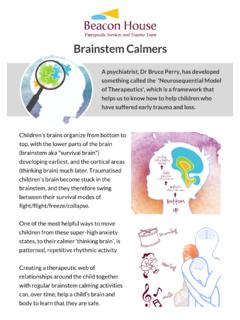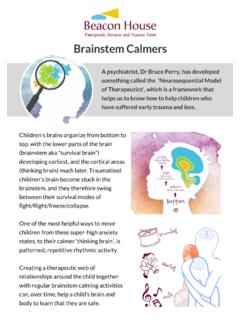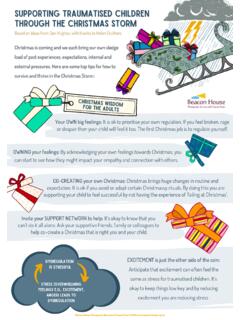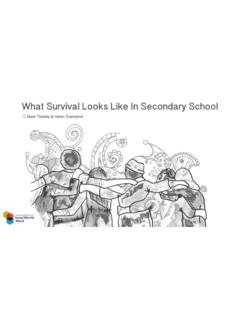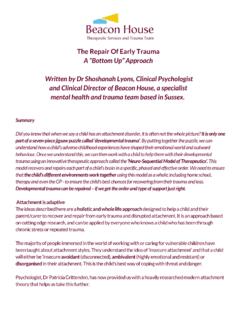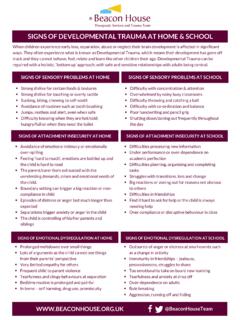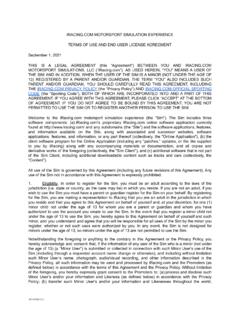Transcription of D e v e l o p m e n t a l T r a u m a
1 U P D A T E D J A N U A R Y 2 0 2 0 Developmental Trauma Close UpAuthors:Dr Shoshanah Lyons, Dr Kathryn Whyte, Ruth Stephens and Helen Townsend @BeaconHouseTeamFOLLOW US:2020 Beacon House Therapeutic Services & Trauma Team All Rights ReservedOur experience of working with children who have suffered early trauma and loss is that they are often misdiagnosed and misunderstood by professionals, friends and family who have the best interests of the child at heart, but who don't yet know about the impact of early trauma. Labels of being naughty , autistic , ADHD or behavioural problems often lead to adultresponses which, at times, can hold back the child from progressing and developing.
2 This articleaims to help adults around the child to understand their behaviour and their hidden needs from a trauma-informed perspective. This article has been written for parents, carers, friends and family of children who have experiencedearly loss, trauma and attachment disruption. It has also been written for professionals who are workinghard to support or teach vulnerable children, but who often feel disarmed and at a loss with how toeffectively help the profound and complex difficulties they observe. Last but not least, this article is foradults who experienced loss or trauma during their own childhood, and who may find that theinformation here deeply resonates with their own life story.
3 We will draw on current evidence andthinking to re-frame the problems often seen in these children as wise adaptations to the lessons thatlife has taught them. We will unpick and explain the spectrum of challenges traumatised children face, known as Developmental Trauma , and share ideas for how to help the repair of early is this article important? Who might experience Developmental Trauma?What does Developmental Trauma look like?What can parents/carers and professionals do to help?2019 Beacon House Therapeutic Services & Trauma Team All Rights Reserved- 2 -Developmental Trauma Close Up | Updated January 2020 This article takes a close up look at Developmental Traumawhere we explore:Who can suffer developmental trauma?
4 - 3 -Developmental Trauma Close Up | Updated January 2020We hear many parents and carers tell us that their child was too young to remember the traumaticevents in their early life; or indeed that their child was removed from their birth mother withindays of being born and placed with loving and safe foster carers. We also often see professionalsnot paying attention to a child s early adversity because there is a common belief that earlyadversity is not related to current problems, particularly if the problems do not look like typicaltrauma or the individual does not see themselves as having been through trauma.
5 The child scomplex and challenging behaviours as they grow up can then become quite a mystery, and canlead to very high levels of distress within families, hopelessness in professionals and unmet needsin young people that can lead them to be at risk. The story of who suffers trauma paints a very different picture. Pioneering research has shown uswith robust neuro-scientific evidence that unborn babies can suffer trauma to their developing mindand body when they are in the womb; for example, if their birth mother:Research has shown us that a history of severe trauma in the parents can even change the unbornbaby s genetic makeup; and trauma during pregnancy means that the baby is born hardwired to beover-sensitive to life s stresses.
6 Was in a violent relationship with a partner, friend or family member Used alcohol and substances Has a history of trauma herself Suffered serious mental health problems or toxic stress 122019 Beacon House Therapeutic Services & Trauma Team All Rights ReservedWho can suffer developmental trauma? (cont)- 4 -Developmental Trauma Close Up | Updated January 2020 Recent research by Dr Bruce Perry and his team hasshown us that the experience of early loss and traumadoes not dictate a child s future, in isolation from otherimportant factors. In other words, there are other veryinfluential experiences which can buffer the impact ofearly adversity.
7 In particular, the presence of safe andavailable adults at the time of the trauma. The age of the child when the trauma(s) occurred alsoinfluences the impact on their later , stress and loss in the first 8 weeks of a baby slife has the most influence on their later influential for the child than their early trauma, isthe quality and quantity of their safe relationships. Thisis a very hopeful message from the s not all about what happenedExperiences that happen during pregnancy or within the first four years cannot be explicitlyremembered by the individual, however, research is very clear that it these very experiences which shape our later development and well-being.
8 The body remembers, even when the mind cannot. Early trauma can arise from things happening that shouldn t have happened ( abuse, separation, medical interventions), and from things that didn t happen that should have happened (emotional and physical neglect). Neglect is often invisible, because children whose parents are emotionally unavailable and cold for example, do not know anydifferent and have no incidents to disclose to Beacon House Therapeutic Services & Trauma Team All Rights ReservedWhat is Developmental Trauma?Developmental Trauma Close Up | Updated January 2020- 5 -A psychiatrist, Professor Bessel Van der Kolk, showed us thatearly trauma creates an assault on the child s developmentover time.
9 Not only do traumatised children develop a range of unhealthy coping strategies which is how theyadapted to threat, they also do not develop the essential daily living skills that children need, such as being able to manage impulses, solve problems or learn new information. The bottom line is: a child who does not feel safe primarily lives in their fight/flight/freeze/collapse responses in order to survive the real or perceived danger they Trauma is the term used to describe the impact of early, repeated trauma andloss which happens within the child s important relationships, and usually early in life.
10 Common stories include: A baby or child relinquished by birth parentsA baby or child removed or relinquished from birth parents because they have beenphysically/sexually/emotionally abused A baby or child who has been neglected A child who lives between harmful birth parents and safe friends/family over a long A child removed at birth and who goes on to experience multiple adverse experiences, A child living with a safe and loving family, but who suffers sexual abuse from outside thefamily from a young ageA baby or child removed from safe foster carers placed into a safe adoptive familyA child who experienced severe health problems and multiple medical interventions period of time such as death of a carer; bullying; physical illness.
